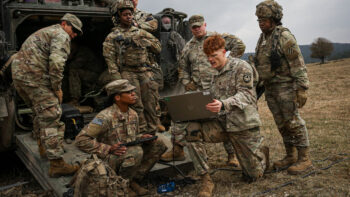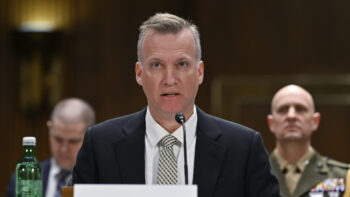
Senator Elizabeth Warren, a Democrat from Massachusetts, wrote a letter to Pentagon leaders regarding newly restricted information on weapons systems. (Al Drago/Bloomberg via Getty Images)
WASHINGTON: A new, restricted version of the Pentagon’s annual report on weapons testing could stifle public access to information and endanger US national security, Sen. Elizabeth Warren said in a letter sent to Pentagon leadership today.
Last week, the Pentagon’s director of operational test and evaluation, or DOT&E, released its annual report, which typically provides information about whether a weapon system works effectively in an operational environment, or whether technical glitches or safety problems are marring performance.
But this year, many performance details typically included in the report were restricted from the public version, and instead were discussed in a “controlled unclassified information” version that is only accessible to Defense Department officials and lawmakers.
“This unjustified restriction of public access will not serve to protect national security information but will instead be abused to avoid disclosure of failures in our major weapons programs,” Warren, D-Mass., said in letters [PDF] to Defense Secretary Lloyd Austin and Nickolas Guertin, the director of operational test and evaluation.
“I urge you to reverse the decision to classify these reports,” wrote the senator, who is a member of the Senate Armed Services Committee.
RELATED: New Pentagon report censors details on weapons programs’ performance, flaws
Warren’s letters cite reporting from Breaking Defense, which noted that DOT&E had redacted performance information for 22 programs from the public version of the report, making details available only in the “controlled version.” This included sections on high-profile and historically troubled programs like the Marine Corps’ CH-53K helicopter, which included no information about how the system had performed in tests.
While Warren acknowledged that some findings of the report are “appropriately classified,” details that are designated as “controlled unclassified information” are neither proprietary information nor classified.
Continuing to publish a controlled version of the report will limit the information available for oversight organizations charged with “holding the Department accountable and ensuring taxpayer dollars are being spent responsibly,” Warren said.
“This also endangers national security by making it more likely we will field weapon systems that unnecessarily jeopardize the lives of servicemembers and negatively affect their performance on the battlefield. Preventing full disclosure makes it less likely that key design deficiencies, safety issues, and capability shortfalls will be properly addressed before they are deployed,” she said.
Oversight organizations have raised concerns that, by moving details on technical flaws to a CUI version, the Pentagon will feel less pressure to resolve deficiencies quickly.
“DOT&E already has the ability to include classified reporting,” Mandy Smithberger of the Project on Government Oversight told Breaking Defense in December. “I worry that this will end up [resulting] in a watered down version of the report that makes it more difficult for the press and the public to make sure that we are buying weapon systems that are effective and safe.”
But Raymond O’Toole, acting head of the DOT&E office, defended the office’s decision to create a CUI version, saying in December that the services would ultimately be responsible for what information is designated as “controlled.”
Pentagon spokesperson Jessica Maxwell declined to comment on the letter to Breaking Defense, saying, “As with all Congressional correspondence, we will respond directly to the author.” However, in response to a Bloomberg story about the letter, Maxwell told the outlet the DOT&E “has not hidden any information from Congress as demonstrated by an array of unclassified, controlled unclassified and classified reports delivered to Congress” this year and every year. Maxwell reportedly said publishing different editions of the report is done “to optimize data-sharing with wide audiences.”
In a Taiwan conflict, tough choices could come for Big Tech
Washington could do more to incentivize tech companies to distance themselves from China, but CEOs should examine how they’d react to a fight in the Pacific, CSET’s Sam Bresnick and Emelia Probasco argue.


























